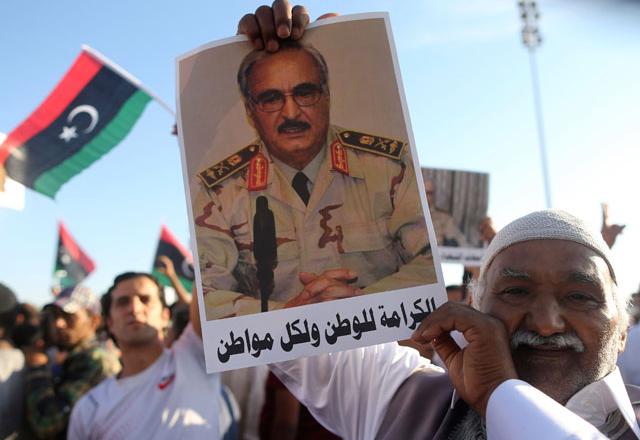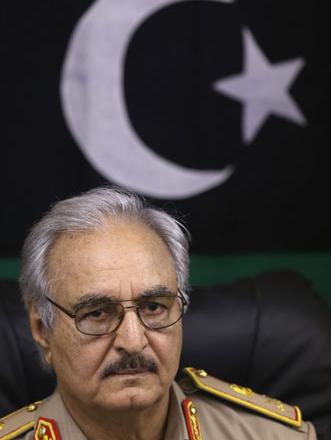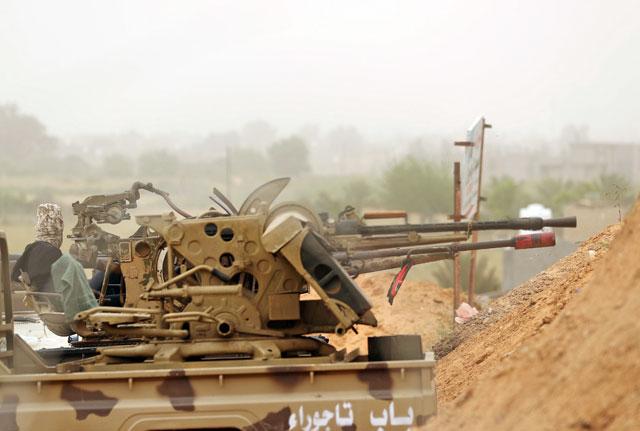You are here
Embattled Libyan government loses grip as general expands power
By Reuters - Feb 23,2015 - Last updated at Feb 23,2015

BAYDA, Libya — In a hotel lit by a generator in the eastern Libyan town of Bayda, Economy Minister Munir Ali Asr outlines optimistic plans to attract investment to a country ravaged by war and political chaos.
Outside, Bayda lies in darkness after another power cut. Hundreds of residents wait outside petrol stations that have closed as a result of a debilitating power struggle between two rival governments that has wrecked basic services.
Growing frustration over the reality of life in eastern Libya, which contrasts with the promises of politicians, is feeding support for a former army general, Khalifa Haftar, who has set himself up as a warrior against Islamist militancy and who some also see as their saviour.
The internationally recognised prime minister, Abdullah Al Thinni, and his government sit in Bayda, while a rival faction, Libya Dawn, has set up its own government in Tripoli, 1,200 km away, after taking over the capital last summer.
"I am tired of politicians just talking and talking," said Raed, an oil service manager who has been demonstrating in front of Thinni's office. "Thinni is too weak to end this mess. We need a military council headed by Haftar."
Haftar, who has merged his own troops with regular army forces to fight Islamists, is styling himself as a would-be strongman in the east.
But while his fighters have won back some territory from Islamists in Benghazi, Haftar is proving a divisive figure among those around Thinni, the parliament, and a federalist movement demanding autonomy for the east.
Critics say Haftar, who did not respond to a request for an interview, sees himself as Libya's version of Egyptian President Abdel Fattah Al Sisi, a former military man.
Certainly, Haftar misses no opportunity to praise Sisi. His war planes joined Egyptian jets bombing suspected Daesh targets in Libya this week after the jihadist group released a video showing the beheading of Egyptian Coptic Christians.
"Haftar wants to dominate. But if you want to build a state nobody should be above accountability," said a minister in Thinni's Cabinet, asking not to be named.
Uneasy alliance
Haftar tends to pop up whenever there is upheaval in Libya. He helped Muammar Qadhafi to power in 1969 but fell out with him after a disastrous defeat suffered by troops he was commanding during Libya's war with Chad in the 1980s.
He was rescued with the help of the United States and lived there until he joined the uprising against Qadhafi in 2011.
In 2013, the grey-haired army veteran ordered parliament dismissed although nothing happened. He has since given a series of televised speeches announcing such things as the establishment of a military council, the imminent "liberation" of Benghazi, and his retirement plans.
Officials in Bayda struggle to explain their relationship with Haftar. They need his forces but prefer not to talk about it.
Lawmakers have several times confirmed and then denied the existence of a decree signed by the parliamentary speaker recalling Haftar to official duty.
But there is no doubt that he is dominating politics in the east. Haftar's top air force officer, Saqer Al Joroushi, has been put in command of the regular air force with the support of his son, a member of the eastern parliament. The regular army is now calling itself the "Libyan National Army", a name already in use by Haftar's troops.
Military sources say regular army commanders in Benghazi feel sidelined as Haftar's officers say they speak for the government.
In an apparent power play, Haftar's forces tried to stop Thinni from visiting Benghazi. Thinni suspended his interior minister, Omar Al Zanki, for making the incident public after Haftar put pressure on the prime minister, military sources say.
Weakness
Thinni is in a weak position, even in his seat at Bayda, a town in the Green Mountains of eastern Libya. It is packed with people who have fled Tripoli complaining of threats or attacks from Libya Dawn.
"The situation not stable," said a soldier at a checkpoint near Thinni's office. Some 50 protesters have showed up several times to demand Thinni's resignation. His scared staff left their posts on one occasion.
"I don't like Haftar. But only he as a military man, and a military council, can save Libya," said a protester who gave his name as Abdelaziz.
A Libyan entrepreneur dismissed the protesters as "thugs paid by the new Qadhafi, Haftar".
Having no ministries, Thinni's team work out of hotels or rented villas. They claim to be in contact with Tripoli-based state bodies but power cuts in Bayda make it almost impossible to make calls.
Thinni's economy ministry said it had released strategic wheat reserves in response to a flour crisis. But the chairman of a Tripoli-based state fund in charge of allocating wheat said he was not aware of any such statement.
"We have a crisis committee in place," said economy minister Asr when asked how basic services will be restored.
He acknowledged difficulties but said Libya had a bright future as an investment destination and trade gateway for Africa. "There is no need to be worried about Libya's economy."
Related Articles
Airport guards stopped Libya's Prime Minister Abdullah Al Thinni from getting on a plane to Tunis in protest against his choice of interior minister, officials said, in a stark demonstration of the collapse of state authority in the oil producer.
The president of Libya's elected parliament has proposed the appointment of General Khalifa Haftar, who leads his own troops, as commander of the army loyal to the government based in the east of the country, the parliament spokesman said on Wednesday.
TRIPOLI — Libya's unity government has bitterly criticised France for its stand in the offensive on Tripoli by the forces of Khalifa Haftar,
















